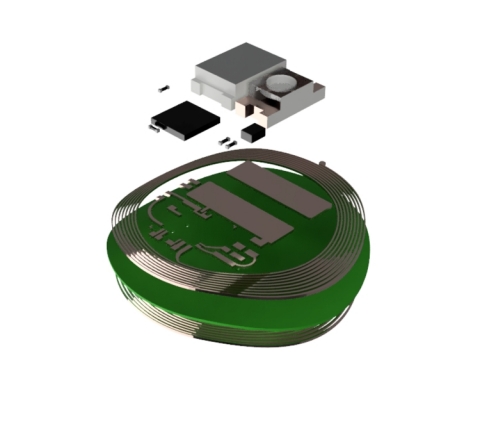CAMBRIDGE, Mass.--(BUSINESS WIRE)--LEO Science & Tech Hub, the Boston-based R&D innovation unit of LEO Pharma, announced today that they will partner with Wearifi Inc. and the Center for Bio-Integrated Electronics at Northwestern University to investigate the clinical potential of next-generation wearable electronics in dermatology research. Wearifi designs and develops the world’s smallest, battery-free wearable device. The collaboration will evaluate whether the device and miniaturized sensor technology can inform and enhance drug development and treatment regimens by potentially identifying and measuring key disease-associated biomarkers.
“We are excited to be working with LEO Science & Tech Hub on developing next generation wearables that have the potential to enable personalized medicine for patients suffering from inflammatory skin disease. Natural byproducts from skin metabolism represent a powerful opportunity for biomarker discovery that may create new approaches to diagnose disease, predict clinical deteriorations, and track individual treatment responses,” says Steve Xu MD, Medical Director of the Center for Bio-Integrated Electronics and Instructor in the Department of Dermatology at Northwestern University.
“Wearifi’s miniature wireless devices allow for imperceptible and unobtrusive placement practically anywhere on the body and are currently used to monitor heart rate, respiration rate and UV exposure,” says Anthony Banks, Chief Technology Officer for Wearifi Inc. “Partnering with a leading biopharmaceutical company like LEO to leverage this mm-scale sensor technology could potentially open new avenues to advance skin health.”
“Effectively bringing Wearifi products into the dermatology space will be a challenging endeavor, but one that will push boundaries and help us better understand our limits with regards to the relationship between technology and skin health. We have an opportunity in front of us to learn informative new details about our largest organ and potentially yield pioneering results for our industry,” says Troels Marstrand, Chief Data Scientist at LEO Science & Tech Hub. Initial steps will include a proof of concept study in collaboration with dermatologists and engineers at Northwestern University’s Center for Bio-Integrated Electronics and Northwestern University Feinberg School of Medicine’s Department of Dermatology. The teams involved will explore the feasibility of creating a wearable Volatile Organic Compound (VOC) detector for continuous measurement of both external and internal VOCs.
The LEO Science & Tech Hub is recognized for its unique collaborative approach of seeking cutting-edge technology for dermatological applications. Since its launch, the Hub has successfully formed multiple partnerships to explore minimally invasive biomarker technologies, drug delivery devices, advanced imaging systems and remote monitoring methods with leading research institutes and biotechnology companies including MIT, Epicore Biosystems, The Karp Lab, Novopyxis, Elektrofi and The Wellman Center for Photomedicine at Massachusetts General Hospital.
About Wearifi Inc.
Wearifi Inc. is a spinout from the John
Rogers’ Laboratory at Northwestern University’s Center for
Bio-Integrated electronics. Wearifi Inc. is revolutionizing wearables
through miniaturized sensors small enough to fit on fingernails that
work completely battery-free. The company has established development
partnerships with multinational companies including L’Oreal, and funding
from the U.S. Department of Defense and the National Institutes of
Health. For more information, please visit www.wearifi.net
or email info@wearifi.net.
About Northwestern University’s Center for Bio-Integrated Electronics
The
Center for Bio-Integrated Electronics (CBIE) was established in 2016 by
Prof. John Rogers as part of the Simpson Querrey Institute for
BioNanotechnology. The CBIE supports fundamental, applied and
translational biomedical research to develop soft, biocompatible forms
of bioelectronics with unique functionality that could fundamentally
transform health care. For more information please visit http://bioelectronics.northwestern.edu
or email cbie@northwestern.edu.
About LEO Science & Tech Hub
The LEO Science & Tech Hub
is an R&D innovation unit of LEO Pharma dedicated to identifying,
developing, and funding innovative solutions that improve the lives of
people with skin diseases. It was founded in 2016 as a catalyst to
transform early-stage innovations into solutions for improving the lives
of people with skin diseases. We collaborate, explore cutting-edge ideas
and make investments. We are an agile group of scientific experts with
an entrepreneurial mindset and a vision of how to give patients control
over disease by predicting, diagnosing, and monitoring conditions. The
LEO Science & Tech Hub is based in Cambridge, Mass. For more
information, please visit www.leo-scitech.com,
or connect with us at engage@leo-scitech.com,
on Twitter @LEOscitech
or LinkedIn www.linkedin.com/company/leo-science-&-tech-hub/





